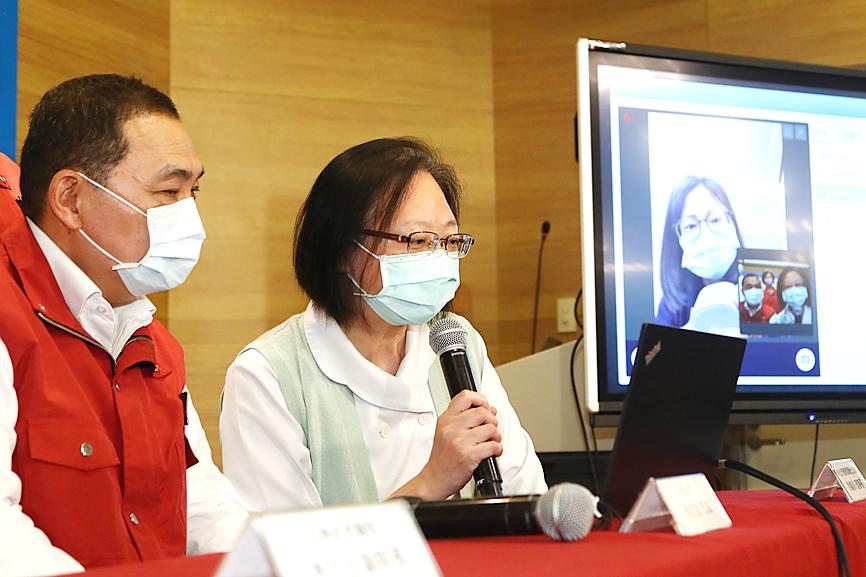New Taipei City residents aged 65 or younger who contract COVID-19, but are asymptomatic or have only mild symptoms can now quarantine at home, the New Taipei City Government said yesterday, as it adopted a new Central Epidemic Command Center (CECC) protocol on a trial basis.
The announcement came as the center yesterday reported 439 new domestic cases, the second-highest daily increase this year.
Given the “shockingly high” transmission rate of the Omicron variant of SARS-CoV-2, and that most of those infected only have mild or no symptoms, the city is asking people who meet certain conditions to quarantine at home, New Taipei City Mayor Hou You-yi (侯友宜) told a news conference.

Photo: CNA
CECC data showed that 99.6 percent of those infected so far this year had mild or no symptoms.
To prevent the city’s medical system from being overburdened, with the number of cases is expected to rise sharply, people aged 65 or younger, who are not pregnant and not undergoing kidney dialysis, should isolate at home, Hou said.
Seven hospitals in the city — Far Eastern Memorial Hospital, Mackay Memorial Hospital’s Tamsui (淡水) branch, Tzu Chi Hospital, Shuangho Hospital, New Taipei City Municipal Hospital, Tucheng Hospital and Fu Jen Catholic University Hospital — are to provide remote services to those in home quarantine, he said.
“Moving forward, our medical team will conduct telephone interviews with confirmed cases to determine whether to send them to hospital or centralized quarantine, or to advise them to self-isolate at home,” New Taipei City Department of Health Director Chen Jun-chiu (陳潤秋) said.
People quarantining at home for 10 days are required to install the iCare smartphone app, which connects to health-monitoring devices through Bluetooth and sends data to city hospitals, she said.
People in home quarantine must also fill out a health questionnaire three times per day and videoconference with medical staff on their mobile devices, she said, adding that if a person’s health appears to be deteriorating, they would be admitted to a hospital.
The city is also working with the New Taipei City Pharmacists’ Association to remotely prescribe medications, which would be delivered within 24 hours, she said.
Separately, Taiwan has signed a second contract with US drugmaker Pfizer to procure 350,000 courses of its COVID-19 treatment Paxlovid, which are to arrive by the end of June, Minister of Health and Welfare Chen Shih-chung (陳時中) said yesterday, after the government pledged to gradually reopen the nation’s borders.
The second contract also stipulates that Taiwan has the option to buy another 350,000 courses if necessary, said Chen, who heads the CECC.
The remaining courses of Paxlovid, which Taiwan purchased in its first contract, are to be delivered in batches in the coming two weeks, he said.
Taiwan signed a deal with Pfizer in January for 20,000 courses of Paxlovid, of which 4,800 courses have arrived.
A total of 136 courses have been used so far, Chen said.
The CECC has previously said that Paxlovid can be prescribed to treat mild-to-moderate cases of COVID-19 within five days of the onset of symptoms for adults and children aged 12 and older with a minimum weight of 40kg, if they are assessed to be at high risk of developing a severe illness.
Additional reporting by CNA and Reuters

CHAOS: Iranians took to the streets playing celebratory music after reports of Khamenei’s death on Saturday, while mourners also gathered in Tehran yesterday Iranian Supreme Leader Ayatollah Ali Khamenei was killed in a major attack on Iran launched by Israel and the US, throwing the future of the Islamic republic into doubt and raising the risk of regional instability. Iranian state television and the state-run IRNA news agency announced the 86-year-old’s death early yesterday. US President Donald Trump said it gave Iranians their “greatest chance” to “take back” their country. The announcements came after a joint US and Israeli aerial bombardment that targeted Iranian military and governmental sites. Trump said the “heavy and pinpoint bombing” would continue through the week or as long

TRUST: The KMT said it respected the US’ timing and considerations, and hoped it would continue to honor its commitments to helping Taiwan bolster its defenses and deterrence US President Donald Trump is delaying a multibillion-dollar arms sale to Taiwan to ensure his visit to Beijing is successful, a New York Times report said. The weapons sales package has stalled in the US Department of State, the report said, citing US officials it did not identify. The White House has told agencies not to push forward ahead of Trump’s meeting with Chinese President Xi Jinping (習近平), it said. The two last month held a phone call to discuss trade and geopolitical flashpoints ahead of the summit. Xi raised the Taiwan issue and urged the US to handle arms sales to

State-run CPC Corp, Taiwan (CPC, 台灣中油) yesterday said that it had confirmed on Saturday night with its liquefied natural gas (LNG) and crude oil suppliers that shipments are proceeding as scheduled and that domestic supplies remain unaffected. The CPC yesterday announced the gasoline and diesel prices will rise by NT$0.2 and NT$0.4 per liter, respectively, starting Monday, citing Middle East tensions and blizzards in the eastern United States. CPC also iterated it has been reducing the proportion of crude oil imports from the Middle East and diversifying its supply sources in the past few years in response to geopolitical risks, expanding

Pro-democracy media tycoon Jimmy Lai’s (黎智英) fraud conviction and prison sentence were yesterday overturned by a Hong Kong court, in a surprise legal decision that comes soon after Lai was jailed for 20 years on a separate national security charge. Judges Jeremy Poon (潘兆初), Anthea Pang (彭寶琴) and Derek Pang (彭偉昌) said in the judgement that they allowed the appeal from Lai, and another defendant in the case, to proceed, as a lower court judge had “erred.” “The Court of Appeal gave them leave to appeal against their conviction, allowed their appeals, quashed the convictions and set aside the sentences,” the judges